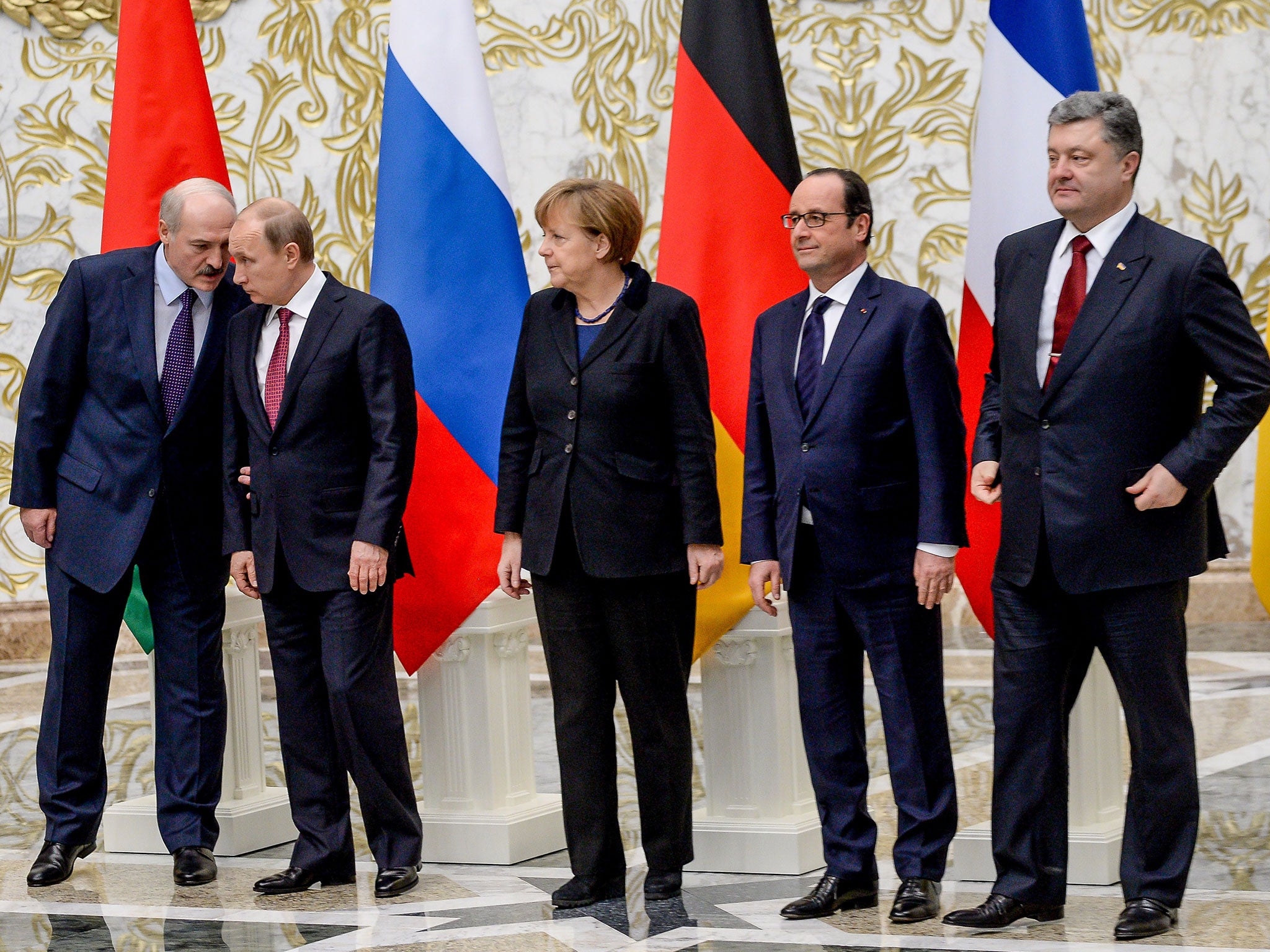Ukraine crisis: Can the UK any longer aspire to a global role?
Would we not be better concentrating on the defence and well-being of our own backyard?


If the Prime Minister and others gave the impression that they were untroubled by observations about the UK’s absence from the Ukraine negotiating table, subsequent statements suggest something different. Since then, ministers have seized every opportunity to declare their deep concern about events in that part of Europe and stress their engagement.
The latest was the Defence Secretary, Michael Fallon, who told reporters from the more hawkish end of the British press that President Putin posed a “real and present danger” to the Baltic states and constituted “as much of a threat to Europe as Islamic State [Isis]”. Nato, he said, was “getting ready” for “any kind of aggression from Russia”.
There was just one problem with this lofty statement of preparedness: Fallon was at that very moment winging his way in quite the opposite direction – to Sierra Leone, as it happened – in a quite spectacular mismatch of words and deeds. What was that about speaking softly and carrying a big stick?
Now it is not quite correct to say that the UK has been sitting on its hands over Ukraine, though EU diplomats have been heard to comment that London just does not seem that interested. Earlier this month, the Ministry of Defence said that Britain would contribute four typhoon fighter jets and 1,000 troops to a Nato rapid reaction force designed to reassure the Baltic states. This is not an enormous contribution from Europe’s second-biggest military (after France), but it is not nothing – and anyway symbolism has a value of its own.
In talking tough about Russia and the security of Europe’s eastern flank, while travelling to Sierra Leone, however, the Defence Secretary unwittingly summed up one of this country’s most pressing dilemmas. The UK may occupy a permanent seat at the UN Security Council and it may have an independent nuclear deterrent (if you don’t define “independent” too closely), but how realistic is it to aspire any more to a global role? Would we not be better concentrating on the defence and well-being of our own backyard?
This is the nub of a discussion that is simmering beneath the surface of British politics, but has yet to graduate into a full-on national debate. It brings together our diplomatic stance, our future military capability and how we see ourselves in the world. All those elements are currently in flux, in a way that could change the UK and its self-image for ever.
I first caught wind of the controversies – and the unease of many in the upper echelons of the military – before Christmas, when a very senior former member of the top brass stood up at a gathering of foreign policy “wonks” to deplore what he saw as the British public’s current aversion to military combat. He called on his erstwhile comrades-in-arms to put themselves about more, to campaign publicly for the UK to honour its military heritage, and to defend the usefulness of international involvement.
But who were the top brass – past or present – to try to dictate, either to elected politicians, or to UK voters, what they should think? Is not a central principle of Western democracy the subordination of the military to political leadership? Claim a voice in the discussion by all means, but the intention here seemed to be to more than this.
The current distaste of the public for new interventions is hardly irrational. Consider the experience of the past 20 or so years. From Afghanistan, through Iraq, to Libya, the UK’s military endeavours have hardly been crowned in glory. The top brass may blame the politicians (sotto voce) for these failures, even as they admit – also sotto voce – that they did too little at the time to warn of the risks and cost. The refusal of the public, and Parliament, to authorise intervention in Syria was a direct consequence of these failures.
The picture is not entirely bleak. The Kosovo intervention just about attained its objectives, though this new nation-state is nowhere near being able to stand on its own two feet. But probably the only success has been Sierra Leone (though, again, distance may supply a flattering veneer). Contrast the plight of Ukraine, today, however, and Michael Fallon’s chosen destination this week can well be understood.
More difficult to discern is what lies behind the arguments now being half-aired. The top brass clearly hoped for better relations with a Conservative Prime Minister than has actually been the case. How far does discontent at the top stem from resistance to further projected reductions in manpower, including at the senior officer level, from inter-service rivalry, or from resentment about the apparently diminished influence of the military at the UK’s top table?
Earlier this week, the head of the army, General Sir Nicholas Carter, sounded a conciliatory note, accepting that the size of the military and what it was required to do were proportionate, though the way he couched this implied there were dissenters. A few days earlier, the former head of MI6, Sir John Sawers, had talked of the pros – and the cons – of military intervention, saying it was something the country had to decide.
At present, it seems, there are two divisions. One is between a proud professional military and a civilian public tired of distant wars “of choice”. The other is between the “opinion-forming” elite – who retain, according to a recent Chatham House survey, a desire to see the UK playing a global role – and the rest. It is not clear where the “rest” stand. But if the closed-door discussion produces an open debate, we – and the next government – might usefully find out.

Join our commenting forum
Join thought-provoking conversations, follow other Independent readers and see their replies